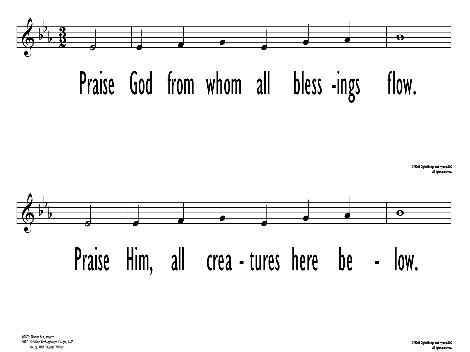- |
User Links
Praise God, from Whom All Blessings Flow
Hymn Information
- First Line
- Praise God from whom all blessings flow (A Deus, supremo benfeitor)(만복의근일하나님)(Oo ne la nuh hiIikidodah)(Bóhólníihii baa dahohniih)(Gott Vater, dem sei ewig Herr)(Gloire à Dieu)(A Dios, el Padre celestial)(Aan God de Vader zij de eer)(たたえよ主の民)(颂赞上主万福之源)
- Author
- Thomas Ken (1709)
- Adapter (Portugese)
- Sarah Poulton Kalley (1861)
- Translator (Dutch)
- J. W. Nordholt
- Translator (German)
- Martin Luther (1543)
- Author (Dutch)
- Ambrose, 340-397 (alt.)
- Text Source
- Korean tr. The United Methodist Korean Hymnal Committee · Cherokee tr. traditional · Mohawk tr. traditional
- Tune Name
- GENEVAN 134/OLD HUNDREDTH
- Composer
- Louis Bourgeois (1551)
- Topic
- Doxologies · Responses: To Offering · Elements of Worship: Praise and Adoration
Copyright Information
- Text Copyright
- Portugese adapt. © Imprensa Metodista · Korean tr. © 2001 The United Methodist Publishing House, admin. The Copyright Company · English text, Cherokee tr., Mohawk tr., Dutch tr., German tr., Japanese tr., and Mandarin tr. - Public Domain
- Tune Copyright
- Public Domain
- Reprint/Projection Information
- Words English: The Words are in the Public Domain; you do not need permission to project or reprint the Words.
- Words Portugese: Please contact the copyright holder for permission.
- Words Korean: Permitted with a license from CCLI.com or from OneLicense.net. If you do not own one of these licenses, please contact the copyright holder for permission.
- Words Cherokee: The Words are in the Public Domain; you do not need permission to project or reprint the Words.
- Words Mohawk: The Words are in the Public Domain; you do not need permission to project or reprint the Words.
- Words Dutch: The Words are in the Public Domain; you do not need permission to project or reprint the Words.
- Words German: The Words are in the Public Domain; you do not need permission to project or reprint the Words.
- Music: The Music is in the Public Domain; you do not need permission to project or reprint the Music.
Scripture References
Further Reflections on Scripture References
The text calls forth praise to God from the whole universe, from creatures on earth and from saints and angels in heaven. Concluding with praise for the Trinity, this doxology is likely the most well-known expression of the doctrine of the Trinity in hymn form.
Bert Polman, Psalter Hymnal Handbook
Confessions and Statements of Faith References
Further Reflections on Confessions and Statements of Faith References
How can the worshiper not conclude with such acclamations! When God is the “overflowing source of all good” (Belgic Confession, Article 1) and when he has provided all the benefits of Christ’s atonement and makes them ours so that “they are more than enough to absolve us from our sins,” (Belgic Confession, Article 22) our hearts cry out to him with praise and adoration. Therefore, Heidelberg Catechism, Lord’s Day 52, Question and Answer 128 includes the ending doxology of the Lord’s Prayer and teaches that “your holy name, and not we ourselves, should receive all the praise, forever.” And so consistent with these thoughts, Our World Belongs to God, paragraph 2 exclaims, “Our World Belongs to God! God is King: Let the earth be glad! Christ is victor: His rule has begun! The Spirit is at work: Creation is renewed! Hallelujah! Praise the Lord!” And the Belhar Confession, Section 5 concludes: “Jesus is Lord. To the one and only God, Father, Son and Holy Spirit, be the honor and the glory forever and ever.”
Praise God, from Whom All Blessings Flow
Additional Prayers
Praise God, from Whom All Blessings Flow
Tune Information
- Name
- GENEVAN 134/OLD HUNDREDTH
- Key
- G Major
- Meter
- 8.8.8.8


 My Starred Hymns
My Starred Hymns







